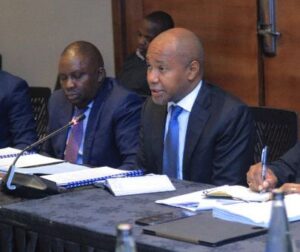
Photo/courtesy.
Telkom Kenya employees are growing increasingly frustrated over prolonged delays in securing a strategic investor, a situation they say has pushed the state-owned telecom company into a deepening crisis.
Since 2020, the government has struggled to bring in a new investor to revive the struggling telco, with repeated promises failing to materialize. The Communication Workers Union of Kenya (COWU-K) says the ongoing uncertainty has stalled the implementation of two fully negotiated Collective Bargaining Agreements (CBAs), which have been tied to the arrival of a new investor.
READ Access Bank Completes Takeover of Standard Chartered
“Telkom Kenya is a national asset. Unless immediate and decisive action is taken, we risk a national communications crisis and the eventual collapse of this historic institution,” warned (COWU-K) Secretary General Benson Okwaro.
“We are now entering the fifth year of waiting. Employees remain in limbo, hope has faded and anxiety continues to grow.”
In 2023 the National Treasury revealed that a United Arab Emirates-based firm was to take up a majority stake in Telkom Kenya from London’s Helios Investment Partners, marking the latest twist in the deal room of the loss-making telco.
In what appeared like hope at last for the troubled Telco, the government had settled on Infrastructure Corporation of Africa LLC (ICA) as the new majority shareholder in Telkom Kenya.
Telkom Kenya has previously pursued external partnerships with France Telecom (Orange) and Helios Investment Group, but these alliances failed to deliver lasting improvements.
As the delays persist, workers are now urging the government to intervene with a bailout to stabilize the company and secure its future.
Both investors eventually exited the market, citing operational and strategic challenges. Now, the government is treading cautiously in its search for a credible strategic investor, one capable of revitalizing Telkom Kenya and addressing its long-standing structural issues.
However, the Communications Workers Union of Kenya (COWU-K) argues that the situation has become dire and Telkom Kenya is effectively running out of lifelines. According to the union, many employees have remained in the same positions for over a decade, with promotions, skill development programs and job reclassifications having stalled entirely. This stagnation has led to widespread staff demoralization.
“Highly skilled professionals with years of experience and a deep commitment to public service have been reduced to bystanders in their own careers,” said COWU-K Secretary General Benson Okwaro. “If the strategic investor is no longer in the picture, say so. If one is still being considered, give us a clear timeline.”
Okwaro emphasized that a government bailout or revival package may now be the only viable solution to stabilize the company, protect national infrastructure and preserve jobs.
In a strongly worded statement released on Tuesday, COWU-K called on the Government of Kenya, the Ministry of Information, Communications and the Digital Economy and Telkom Kenya’s management to address what it termed a “critical threats” to the company’s survival and employee welfare.
ALSO READ eCitizen Overtakes iTax as Kenyans’ Top Choice for Filing Nil Returns
The union also urged ICT Cabinet Secretary William Kabogo to take personal responsibility and act decisively to rescue the state-owned telco, warning that its collapse could have severe repercussions on national communications infrastructure and cost thousands of jobs.
Additionally, the union called for open and honest engagement from Telkom Kenya’s leadership and board of directors.
Once the leading telecom provider in Kenya, Telkom Kenya has found it increasingly difficult to keep up with competitors Safaricom and Airtel, especially after setbacks related to the transition of ATC sites across the country.
The Communication Workers Union of Kenya (COWU-K) says it remains committed to collaborating with all stakeholders to help revive the company but warns that time is quickly running out.




